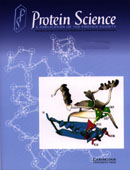Crossref Citations
This article has been cited by the following publications. This list is generated based on data provided by
Crossref.
Ma, Buyong
Kumar, Sandeep
Tsai, Chung-Jung
and
Nussinov, Ruth
1999.
Folding funnels and binding mechanisms.
Protein Engineering, Design and Selection,
Vol. 12,
Issue. 9,
p.
713.
Welker, Ervin
Narayan, Mahesh
Volles, Michael J
and
Scheraga, Harold A
1999.
Two new structured intermediates in the oxidative folding of RNase A.
FEBS Letters,
Vol. 460,
Issue. 3,
p.
477.
Tsai, Chung‐Jung
Kumar, Sandeep
Ma, Buyong
and
Nussinov, Ruth
1999.
Folding funnels, binding funnels, and protein function.
Protein Science,
Vol. 8,
Issue. 6,
p.
1181.
Wedemeyer, William J.
Welker, Ervin
Narayan, Mahesh
and
Scheraga, Harold A.
2000.
Disulfide Bonds and Protein Folding.
Biochemistry,
Vol. 39,
Issue. 15,
p.
4207.
Kumar, Sandeep
Ma, Buyong
Tsai, Chung‐Jung
Sinha, Neeti
and
Nussinov, Ruth
2000.
Folding and binding cascades: Dynamic landscapes and population shifts.
Protein Science,
Vol. 9,
Issue. 1,
p.
10.
Serio, Tricia R.
Cashikar, Anil G.
Kowal, Anthony S.
Sawicki, George J.
Moslehi, Jahan J.
Serpell, Louise
Arnsdorf, Morton F.
and
Lindquist, Susan L.
2000.
Nucleated Conformational Conversion and the Replication of Conformational Information by a Prion Determinant.
Science,
Vol. 289,
Issue. 5483,
p.
1317.
Casadio, R.
Compiani, M.
Fariselli, P.
Jacoboni, I.
and
Martelli, P. L.
2000.
Neural Networks Predict Protein Folding and Structure: Artificial Intelligence Faces Biomolecular Complexity.
SAR and QSAR in Environmental Research,
Vol. 11,
Issue. 2,
p.
149.
Jiang, Sulin
and
Vakser, Ilya A.
2000.
Side chains in transmembrane helices are shorter at helix-helix interfaces.
Proteins: Structure, Function, and Genetics,
Vol. 40,
Issue. 3,
p.
429.
van Mierlo, Carlo P.M.
and
Steensma, Elles
2000.
Protein folding and stability investigated by fluorescence, circular dichroism (CD), and nuclear magnetic resonance (NMR) spectroscopy: the flavodoxin story.
Journal of Biotechnology,
Vol. 79,
Issue. 3,
p.
281.
Ma, Buyong
and
Nussinov, Ruth
2000.
Molecular dynamics simulations of a β-hairpin fragment of protein G: balance between side-chain and backbone forces 1 1Edited by F. E. Cohen.
Journal of Molecular Biology,
Vol. 296,
Issue. 4,
p.
1091.
Jacoboni, Irene
Martelli, Pier Luigi
Fariselli, Piero
Compiani, Mario
and
Casadio, Rita
2000.
Predictions of protein segments with the same aminoacid sequence and different secondary structure: A benchmark for predictive methods.
Proteins: Structure, Function, and Genetics,
Vol. 41,
Issue. 4,
p.
535.
Pappu, Rohit V.
Srinivasan, Rajgopal
and
Rose, George D.
2000.
The Flory isolated-pair hypothesis is not valid for polypeptide chains: Implications for protein folding.
Proceedings of the National Academy of Sciences,
Vol. 97,
Issue. 23,
p.
12565.
Yilmaz, Lutfu Safak
and
Atilgan, Ali Rana
2000.
Identifying the adaptive mechanism in globular proteins: Fluctuations in densely packed regions manipulate flexible parts.
The Journal of Chemical Physics,
Vol. 113,
Issue. 10,
p.
4454.
Grandori, Rita
Schwarzinger, Stephan
and
Müller, Norbert
2000.
Cloning, overexpression and characterization of micro‐myoglobin, a minimal heme‐binding fragment.
European Journal of Biochemistry,
Vol. 267,
Issue. 4,
p.
1168.
Yu, Y.Bruce
Wagschal, Kurt C
Mant, Colin T
and
Hodges, Robert S
2000.
Trapping the monomeric α-helical state during unfolding of coiled-coils by reversed-phase liquid chromatography.
Journal of Chromatography A,
Vol. 890,
Issue. 1,
p.
81.
Chang, Hui-Chuan
Lin, Tai-Lang
and
Chang, Gu-Gang
2000.
Molecular Basis for the Polymerization of Octopus Lens S-Crystallin.
Biophysical Journal,
Vol. 78,
Issue. 4,
p.
2070.
Barron, L.D.
Hecht, L.
Blanch, E.W.
and
Bell, A.F.
2000.
Solution structure and dynamics of biomolecules from Raman optical activity.
Progress in Biophysics and Molecular Biology,
Vol. 73,
Issue. 1,
p.
1.
Kaya, H�seyin
and
Chan, Hue Sun
2000.
Polymer principles of protein calorimetric two-state cooperativity.
Proteins: Structure, Function, and Genetics,
Vol. 40,
Issue. 4,
p.
637.
Levy, Yaakov
Jortner, Joshua
and
Becker, Oren M.
2001.
Dynamics of hierarchical folding on energy landscapes of hexapeptides.
The Journal of Chemical Physics,
Vol. 115,
Issue. 22,
p.
10533.
Higo, Junichi
Ito, Nobutoshi
Kuroda, Masataka
Ono, Satoshi
Nakajima, Nobuyuki
and
Nakamura, Haruki
2001.
Energy landscape of a peptide consisting of α‐helix, 310‐helix, β‐turn, β‐hairpin, and other disordered conformations.
Protein Science,
Vol. 10,
Issue. 6,
p.
1160.


